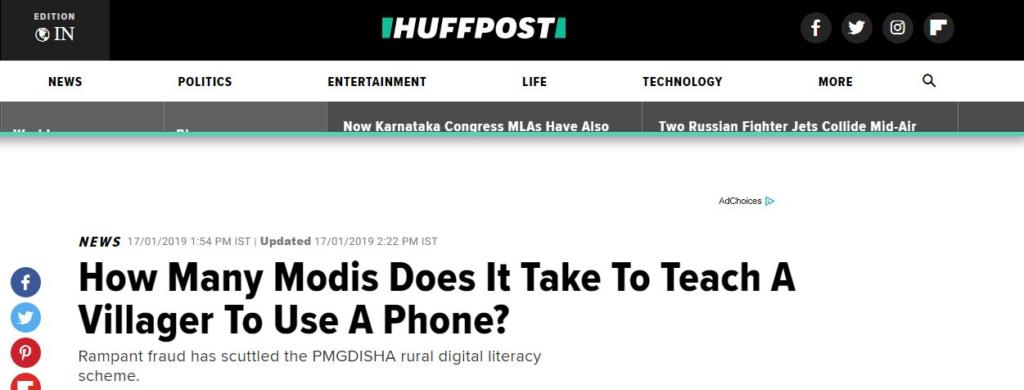There has been a systematic attempt at discrediting the achievements and policies of the Modi Government since 2014. Most of the flagship schemes of the government have witnessed many such hit jobs but most of them have failed as the government has always put the record straight with facts that have debunked most such articles.
The recent article by Huffington Post is no different as it is built on conjectures and lazy analysis that fails to arrive at any conclusive finding. The article talks about the PMGDISHA program under which the government is trying to bridge the digital divide and it alleges that the program has become a flagship scheme for inefficiency and leakages. However, the article fails to provide any concrete evidence of this happening under the program.
What is PMGDISHA?
PMGDISHA is India’s flagship program that aims at bridging the digital divide by providing rural citizens with basic training. The aim is to make them digitally literate and take them together on the path of India’s development. It is a one of a kind programs that recognizes the important of digital literacy as an integral part of development of the society. With 625 training partners and 18866717 registered candidates, this is the world’s largest digital literacy program. The intention behind the program is to ensure that the Digital India program is not just for the rich but the benefits of such a program also extend to the poor sections of the population.
Huffington’s Analysis:
Based on just one example, the Huffington Post has put in question the entire scheme without providing any rationale behind such an inference. They mention that the scheme is badly designed, and this is resulting in frauds and leakages under the program. This conclusion is based on a single survey where the instructor, according to them was “gaming” the system by helping students cheat. This has been made the focal point of the argument by the Huffington Post against the design of this scheme. But the question is, can such a gamification happen?
The answer to this is a strict no and it’s because of the very design of the PMGDISHA scheme that ensures due diligence is done before proclaiming someone is digitally literate. Under the program, the person who obtains the training must send an email to an email ID to confirm that he or she has learned how to send an email while for digital transactions, they have to make 5 transactions of Rs. 1 from their account to the bank account of the CSC.
The PMGDISHA program is linked directly to the Aadhar card of the beneficiary so clearly, the system cannot have any ghost beneficiaries. Besides that, when it comes to making digital transactions, it is evident that Aadhar and Jan Dhan accounts will ensure that there is a clear mapping of the individuals that are obtaining the relevant training. In fact, the only reason behind the transactions being repeated for 5 times is the principle of recursive learning which has been proved to be a systematically superior methodology to impart digital skills.
There is a feedback mechanism under the PMGDISHA scheme and the training partners that are found to be offering inadequate training to the poor are being systematically removed from the program. Therefore, clearly, the article by Huffington Post fails to acknowledge these facts as it aims at presenting a distorted view of the PMGDISHA program.
It is not the first time that such an attempt has been made as earlier programs such as Swachh Bharat, Bharat Net and the Ujjwala Yojna were subject to such hit-jobs, however, these hit jobs are not successful due to the sheer success of the government towards implementation of such schemes. We gyanis expect more such hit-jobs in the coming days but we are certain that with facts, we shall continue to counter them.
(Digitech Gyani are a set of individuals who track the developments in digital industry. They tweet at @DigitechGyani)
